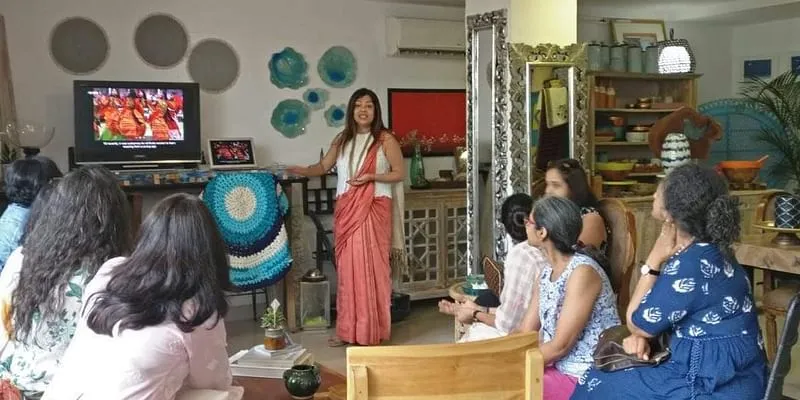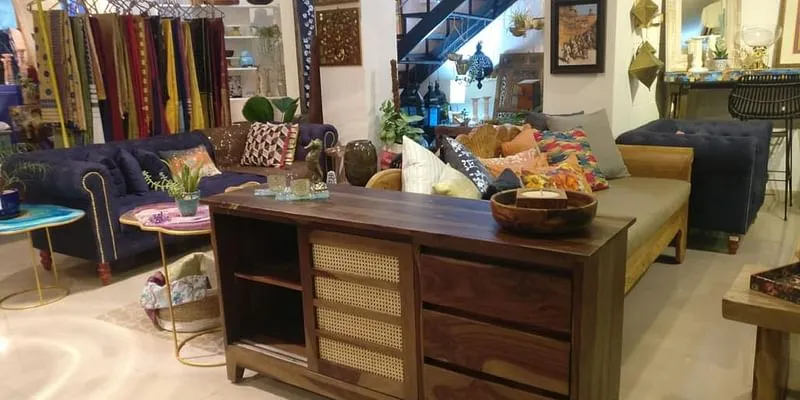This woman entrepreneur is weaving personal stories into her bespoke furniture range
Preeta Dutta’s bespoke interior design startup Miradorlife utilises natural and sustainable materials like reclaimed wood, cane, jute, etc., to design eco-friendly, personalised, and localised products.
While purchasing a house, each one of us have a specific idea to decorate it. And over the years, we try to perfect it by adding small elements, which more or less represent our tastes.
Preeta Dutta, a production designer and entrepreneur, tried doing the same when she purchased her dream home in Mumbai. During the course, Preeta found it difficult to procure furniture that suited her personality.
“The market was filled with either exorbitantly priced, flashy, garish pieces, or mass-produced Malaysian and Chinese MDF goods. It was my frustration with the market that eventually led me to fabricate my own designs and fit them in my (tiny) Mumbai apartment,” Preeta tells YourStory.

Preeta Dutta, Founder and CEO, Miradorlife
Preeta’s ideas finally took shape when she moved to Bengaluru in 2016 and set up Miradorlife, a small furniture studio, out of her garage space in Whitefield.
She says, the bespoke interior designer startup focusses on the customer, weaving a personal story that is a direct result of the individual’s personality, travels, hobbies, and inspirations.
By utilising natural and sustainable materials like reclaimed wood, linen, cane, jute, water hyacinth, terracotta, bell metal, etc., the startup designs eco-friendly, personalised, and localised products, ranging from beds, sofas, consoles, armchairs, foyer benches, and more.
The genesis
‘Mirador’ in Spanish means ‘a window or a lookout with an extensive view’. Preeta says, while travelling in Portugal she came across the word and derived her own meaning.
She says, “To me, it meant a beacon leading a person into beauty. Our life view is so limited, unlike that of nature, which can be boundless. We conceive of limitations in ourselves and bring them into our lives and our homes. Our homes have become blocks of medium-density fibreboards (MDF) and minimal dark straight-lined furniture, devoid of natural texture or tonality.”

Miradorlife studio
Bespoke offerings
According to a report by Research and Markets, the Indian furniture market is expected to garner $61.09 billion by the end of 2023. While the sector is merely a mass-market space for buyers without a connection or concept, Preeta explains she wanted to fill a niche gap.
She says, “What we promote is not just furniture, it’s a lifestyle and an ideology. It’s a way of thinking that differentiates you from the crowd. Our aim is not just to showcase our furniture and décor, but to inspire our followers and customers to embrace the philosophy and rethink the way we live.”
“The Japanese concept of ‘Wabi-Sabi’ is very apparent at Miradorlife, where we believe the more texture, grains, and cracks we see, the more precious is the product. We follow that line of thought along with the liberal use of colour in our furniture to break the morbid monotones found in every third house,” Preeta adds.
Miradorlife’s products are crafted by artisans from Assam, Manipur, Meghalaya, and Bengal. The startup works at the grassroots level with these craftsmen, as well as with local entrepreneurs, to innovate and design unique products.
This way, the startup claims to provide a platform for artisans, as well as drives a significant amount of value addition to the products during the design and manufacturing stage, commanding a premium for its products.
Other than retail sales, in the last few years, the startup has completed over 120 projects.
In the Indian furniture market, Mirador competes against the likes of , , and , among others.

The business and challenges
Bootstrapped since inception, Preeta says the startup staved off investors as it did not want to dilute its brand philosophy.
“As a woman entrepreneur, it’s always a challenge, especially working in a male-dominated industry and dealing with workers at various levels. I’m not just a retailer, as we both manufacture and retail. I’m a carpenter, polisher, painter, and I have also trained my team. My team has always stood by me, since they’ve seen me continuously do hands-on labour with them,” Preeta says.
While the startup relies on social media channels like Facebook and Instagram to promote its products, most of the marketing is through word of mouth of its customers.
“All our marketing efforts have been organic driven, and we have had a fabulous response. In just over two years, our social media reach has seen multifold growth, with over 113,000 engaged followers on Instagram alone. We have fans who love our content, and we have not used any paid media so far,” Preeta says.
Without any investors or loans, and yet growing exponentially, the founder says Miradorlife is an ideal startup story for the post-COVID-19 era.
At present, the startup has a manufacturing unit, and a sales and marketing team in Bengaluru. In the next phase, Preeta says, the startup is looking to scale and focus on generating higher revenue. It also plans to enter the ecommerce market in August.
Amidst the ongoing pandemic, the startup is also providing essential items to sick migrant workers in the Whitefield area of Bengaluru, as well as helping them get back home.
“When I started Miradorlife, our mission was to be a platform that enables people to transform their houses into homes that speak about them, their personality, and their aspirations. It is still our biggest mission today - to give our customers a life with a view,” Preeta says.
Edited by Megha Reddy









